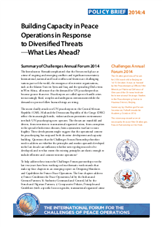POLICY BRIEF 2014:4 Building Capacity in Peace Operations in Response to Diversified Threats—What Lies Ahead?

The Challenges Annual Forum 2014 was held on 14-15 October. It was co-hosted by the Peacekeeping Office of the Ministry of National Defence of China and the China Institute for International Strategic Studies at the Peacekeeping Centre in Huariou District, Beijing.
During the introductory part of the Challenges Annual Forum 2014, it was stated that it took place at a time of ongoing and emerging conflicts and significant uncertainty. International, national and local conflict and friction are challenging various parts of the world, the emergeence of extremist organizations, such as the Islamic State in Syria and Iraq and the spreading Ebola virus in West Africa, all ensure that the demand for UN peacekeepers has become greater than ever. It was further noted that the Annual Forum 2014 marked ten years since China hosted its first high-level conference on peacekeeping, and that the themes of 2004 remain relevant today: the change in the nature of conflicts; the growing influence of regional organizations; the legitimacy challenges posed by host nation power vaccums; the relationship between the root causes of conflict and the humanitarian needs; the increasing complexity of partnerships and actors; and the apparent lack of consesus in the use of force alongside the applicability of the traditional peacekeeping principles. This year’s Annual Forum had capacity building as main focus and addressed, among other issues, the capacity of peacekeepers to face non-traditional threats in areas of peace operations; the capacity of peace operations to face threats against peacekeepers; logistical difficulties in complex and remote peace operations; and building partnerships for the capacity building of peacekeepers.

